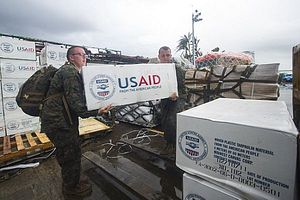So the Naval Diplomat did a segment with BBC Radio 4 last night.
The interview followed up on Wednesday’s commentary, in which I lampooned a certain would-be Asian superpower’s obtuse leisurely approach to typhoon relief. Host Philippa Thomas raised a question about soft power, in sort of a gotcha way, when I opined that the American approach to humanitarian relief beats China’s hands-down. Her question: relief efforts aren’t entirely altruistic, are they?
Quoth I: of course not. States do things out of mixed motives. They hope to derive political gain from everything they do. Why should it be otherwise? But here’s the difference: A nation deserving of soft power acts first in times of crisis and thinks of politics later. Does anyone think President Obama, or any other U.S. president, would hesitate to order forces to disaster-stricken areas if he saw no chance of a diplomatic windfall? Me neither. And that’s my point. Soft power should be effortless, and thus genuine. Think about the U.S. military’s exit from the Philippines twenty-odd years ago, after Mount Pinatubo erupted. Our armed forces responded to the disaster … then they left their Philippine bases anyway.
Thus has it always been. Whatever pundits might tell you, soft power is nothing new, especially for sea services. Only the catchy bumper sticker is. One thinks back to the homeward voyage of the Great White Fleet, which tarried in the Mediterranean Sea to render aid following an earthquake. If President Theodore Roosevelt tried to wring political benefit out of the humanitarian effort, neither he nor history records it.
Such endeavors enhance a nation’s good name — which is what soft power is all about. It’s not about transactions in which donors exact rewards from beneficiaries. Humanitarian and disaster relief, then, are relatively — not absolutely — apolitical, selfless missions.
If done right, that is. If done wrong, the way our friends in a certain big Asian country habitually do it, humanitarian operations aren’t apolitical at all. If a nation worthy of soft power sends aid first and worries about politics later, a nation unworthy of soft power thinks about self-interest first. It can’t separate relief efforts from political matters — from political quarrels in particular. Its leadership dithers, debating whether there’s anything to be gained from alleviating human suffering.
At the very least, such a government’s response lags while the internal debate plays out. It gets behind the problem, making itself look bad in the bargain. That’s especially troublesome when, like our hypothetical big Asian country, you’re the closest major power to the disaster zone and best-positioned to lead the charge. You just look callous. And it’s hard to overcome that first impression later. If you respond belatedly, going into diplomatic damage-control mode, you make yourself look even more self-serving.
Am I taking a victory lap? Not really. The United States has performed well thus far, but the same goes for countries like Australia, Japan, and Great Britain. Many countries have donated generously, commensurate with their means, while scrambling assets to ship supplies to stricken areas. There’s no zero-sum competition for goodwill. Time prevented my rambling on waxing eloquent about this on the Beeb, so there you have it.
So join the team next time, you big Asian country. Do well by doing good.

































